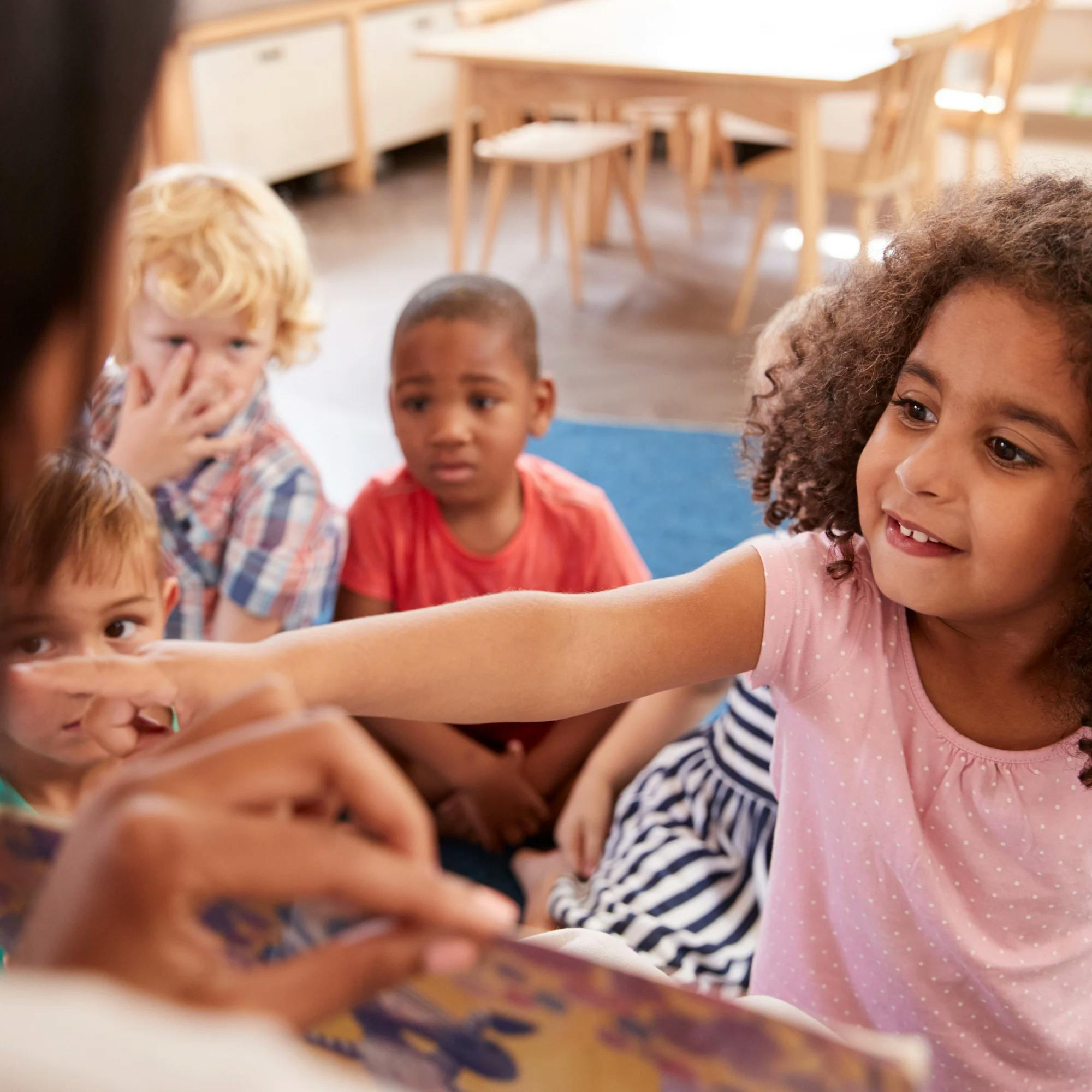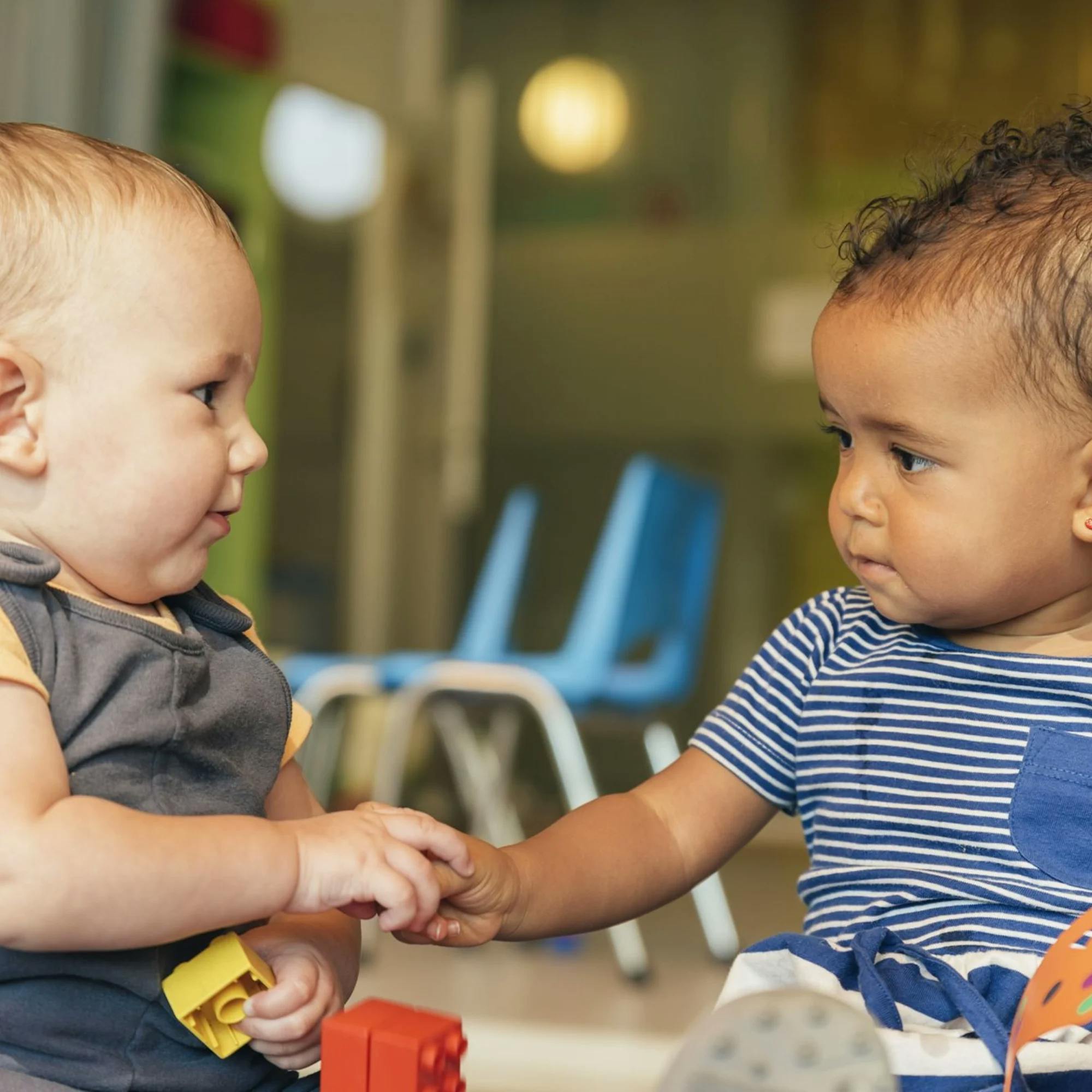A recent study reveals why vocabulary skills are so important for children entering school–and it may not be for the reasons you think. It turns out that preschoolers who have bigger vocabularies benefit in several ways. Find out how, and what you can do to help your child’s language development.
How vocabulary and attention are linked
The researchers looked at vocabulary and attention skills in young children–895 preschoolers across 223 classrooms. They found that the ability to pay attention helps children listen to their teacher, understand classroom routines, and interact with peers. And vocabulary skills influence attention skills.
For example, teachers may give specific instructions to stay seated, or to raise a hand instead of yelling out. Children who can understand and process this language better are more likely to pay attention, participate, and be seen as “good listeners.”


Vocabulary affects social skills and relationships
The study also looked at socialization abilities. Children who know more words are better able to express themselves and get their needs met. This helps them form relationships more easily and leads to better social interactions with both adults and other kids.
In preschool and kindergarten, children are learning how to get along with each other. They learn how to recognize others’ emotions, as well as problem solve. When a child is able to say, “Why are you sad?” or “I’m sorry,” this helps them form relationships. Kids who are behind in vocabulary development may lack these abilities, causing them to miss out on these social routines and opportunities.
Language problems can lead to behavior problems
Children who have a hard time expressing their needs or paying attention tend to struggle more to get what they want or need. They may get frustrated and behave poorly as a result. This sets them apart, and they may be labeled as disruptive or as having difficult behavior. This can isolate them from their peers even further.


How you can help your child with attention or language problems
If you think your child might be struggling, there are several things you can do to help them.
1 Find practical ways to talk together
Children learn language and vocabulary from interacting and speaking with others. Try asking your child open-ended questions like “Why?” and “How?” These types of questions allow us to respond with more complex sentences, which encourages the use of more vocabulary.
While your child might ask you “Why?” often–very often!–try to answer them every time. This is a common developmental stage in kiddos around ages 3 to 4. When you take the time to answer and explain, your child is learning how to answer these types of questions themselves. Plus, you’re modeling new vocabulary about things that they’re interested in.
Reading together is a big deal when it comes to vocabulary development. Making this a routine as soon as possible–even with your baby–helps set the stage for a love of reading. Reading books together also helps your child learn new words as well as how to structure sentences appropriately. If you haven’t done this with your child much, it’s never too late to start!


2 Give your child chances to socialize and play with other kids
If you have friends, relatives, or neighbors with kids near your child’s age, bring them together for some social interaction! Children learn language from the adults around them, but they learn it from other kiddos, too, especially while playing.
Children can also practice different social skills together. In the preschool years, they should begin learning how to play together with other children, rather than side-by-side with them. This provides opportunities for problem solving. There are bound to be disagreements, and they can practice asking what’s wrong, apologizing, and learning to play together peacefully through verbal communication.
3 Help your child focus and pay attention
For kids who have a hard time with attention, try modifying their surroundings to allow for the best learning possible. When they’re doing homework or another task where they need to focus, limit visual and auditory distractions such as the TV, a pet, or siblings. Give your child breaks as needed.
Limiting screen time is also important. Not only can less screen time help with attention skills, it can also help children improve their speech and language skills. This is a win for multiple reasons!
4 Talk with your pediatrician about speech therapy and other supports
If you don’t notice your child making improvements, or if their attention and vocabulary problems seem severe, it may be time to talk to your child’s doctor. They can help determine if your child needs extra help or support.
This extra help might include speech therapy. A speech therapist can assess your child’s speech and language development and any problems they’re having. If your child needs speech therapy, the therapist will develop a treatment plan to help your child catch up to their milestones and gain the language skills they need.
Your child’s pediatrician may also suggest occupational therapy. Occupational therapists can help children regulate their sensory system in order to pay better attention. For example, they may suggest different types of seating or fidget toys to help children channel their energy.
Just because a child has attention difficulties doesn’t mean they have ADHD. But ADHD is a possibility. This is another good reason to bring up your concerns with your pediatrician.
No matter what type of support your child needs, the important thing is that you’re seeking it out for them. Your child is lucky to have you in their corner!
How Expressable Can Help
Concerned your child isn't reaching age-expected milestones? Looking for communication support from a professional? Expressable is a national online speech therapy practice serving children and adults. We treat all major areas of communication and feeding, offer flexible hours including evenings and weekends, and accept most major health insurance plans. We’re proud to have earned more than 3,000 5-star reviews from our clients (4.9/5 average).
Our therapy model is centered on parent and caregiver involvement. Research proves that empowering caregivers to participate in their loved one’s therapy leads to better outcomes. That’s why we combine live, 1-on-1 speech therapy with personalized education and home practice activities for faster progress.
Communication is more than words. It’s how we share how we feel and show who we are. We’re here to help you or your child do just that.

 Abby Barnes, M.S., CCC-SLP
Abby Barnes, M.S., CCC-SLP











